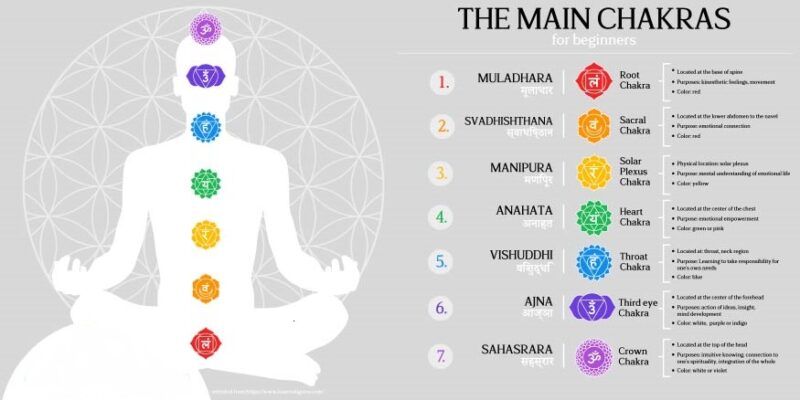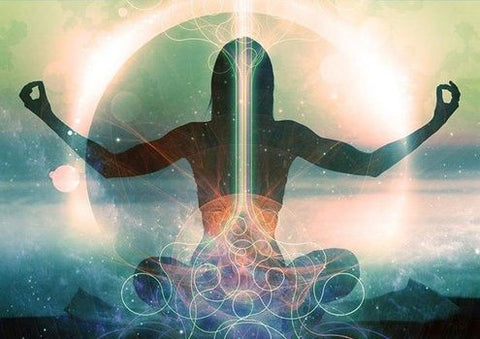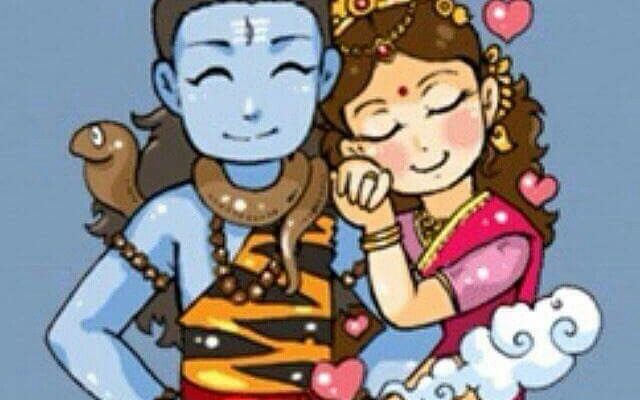When the being is at ajna chakra, point between eye brows, source of creation appears as a star that is…
The Path of Jnana (Wisdom)

Disciple Hemachuda and his guru / wife Hemalekha from Tripura Rahasya
- When Hemachuda understood the significance of his wife’s parable he was agreeably surprised. His voice chocked with pleasure as he said to her:
- “My dear, you are indeed blessed, and clever too: how shall I describe the profound wisdom of the story of your life, narrated to me in the form of a parable.
- “Up to now I did not know your progress. It has all been made as clear to me as a gooseberry resting on the palm of my hand.
4-5. “I now understand the end of humanity and realise wonderful nature. Please tell me further now: who is this mother of yours? How is she without beginning? Who are we? What is our real nature?”
Asked thus, Hemalekha told her husband:
- “Lord, listen carefully to what I am going to say, for it is subtle. Investigate the nature of the Self with intellect made transparently clear.
- “It is not an object to be perceived, nor described; how shall I then tell you of it? You know the mother only if you know the Self.. “The Self does not admit of specification, and therefore no teacher can teach it. However, realise the Self within you, for it abides in unblemished intellect.
- “It pervades all, beginning from the personal God to the amoeba; but it is not cognisable by the mind or senses; being itself un-illumined by external agencies, it illumines all, everywhere and always. It surpasses demonstration or discussion.
- “How, where, when, or by whom has it been specifically described even incompletely? What you ask me, dear, amounts to asking me to show your eyes to you.
11-12. “Even the best teachers cannot bring your eyes to your sight. Just as a teacher is of no use in this instance, so in the other. He can at best guide you towards it and nothing more. I shall also explain to you the means to realisation. Listen attentively.
- “As long as you contaminated with notions of me or mine (e.g., my home, my body, my mind, my intellect), the Self will not be found, for it lies beyond cognition and cannot be realised as ‘my Self’.
- “Retire into solitude, analyse and see what those things are which are cognised as mine; discard them all and transcending them, look for the Real Self.
- “For instance, you know me as your wife and not as your self. I am only related to you and not part of you much less your very being.
- “Analyse everything in this way and discard it. What remains over, transcending at all, beyond conception,appropriation, or relinquishment – know That to be the Self. That knowledge is final emancipation.”
- After receiving these instructions from his wife, Hemachuda rose hurriedly from his seat, mounted on his horse and galloped from the city.
- He entered a royal pleasure-garden beyond the outskirts of the town and into a well-furnished crystal palace.
19-20. He dismissed his attendants and ordered the keepers: “Let no one enter these rooms while I am in contemplation – be they ministers, elders or even the king himself. They must wait until you obtain my permission.”
- Then he went up to a fine chamber in the ninth storey which looked out in all directions.
- The room was well furnished and he sat down on a soft cushion. He collected his mind and began to contemplate thus:
23-30. “Truly all these people are deluded! No one of them knows even the fringe of the Self! But all are active for the sake of their own selves. Some of them recite the scriptures, a few study them and their commentaries; some are busy accumulating wealth; others are ruling the land; some are fighting the enemy; others are seeking the luxuries of life.
When engaged in all this selfish activity they never question what exactly the Self may be; now why is there all this confusion? Oh! When the Self is not known, all is in vain and as if done in a dream. So I will now investigate the matter.
“My home, wealth, kingdom, treasure, women, cattle – none of these is me, and they are only mine. I certainly take the body for the Self but it is simply a tool of mine. I am indeed the king’s son, with goodly limbs and a fair complexion. These people, too, are taken up by this same notion that their bodies are their egos.”
31-36. Reflecting thus, he considered the body. He could not identify the body as the Self, and so began to transcend it. This body is mine, not me. It is built up of blood and bones, and is changing each moment. How can this be the changeless, continuous me. It looks like a chattel; it is apart from me as is a waking body from the dream, etc. ‘I’ cannot be the body nor can the vital force be the Self; mind and intellect are clearly my tools so they cannot be ‘I’.
‘I’ am surely something apart from all these, beginning from the body and ending with the intellect.
[Note. – The intermediates are (1) the senses, (2) the mind including the thinking, reasoning and coordinating faculties, (3) vital force.]I am always aware, but do not realise that pure state of awareness. The reason of this inability is not clear to me.
37-38. Objects are cognised through the senses, not otherwise; life is recognised by touch, and mind by intellect. By whom is the intellect made evident? I do not know…. I now see I am always aware – realisation of that pure awareness is obstructed by other factors (pertaining to the non-self) butting in – Now I shall not imagine them – They cannot appear without my mental imagery of them and they cannot obstruct the glory of the Self, without appearing.
- Thinking thus, he forcibly arrested his thoughts.
40-41. Instantaneously blank superseded. He, at the same time, decided that it was the Self, so became very happy and once again he began to meditate. “I will do it again,” he said and plunged within.
- The restlessness of the mind being thus resolutely checked, he saw in an instant a blazing light with no circumference.
43-45. Regaining human consciousness, he began to wonder how this could happen. ‘There is no constancy in the experience. The Self cannot be more than one. I will repeat and see,’ he said and dived again. This time he fell into a long sleep and dreamt wonderful dreams. On waking up, he fell furiously to think:
46-48. “How is it that I was overpowered by sleep and started to dream? The darkness and light which I saw before must also be in the nature of dreams. Dreams are mental imagery, and how shall I overcome them? “I shall again repress my thoughts and see,” he said, and plunged within.
His mind was placid for a time. He thought himself sunk in bliss.
49-54. Shortly after, he regained his original state, owing to the mind again beginning to function. He reflected:
“What is all this? Is it a dream or a hallucination of the mind?
My experience is a fact but it surpasses my imagination.
“Why is that bliss quite unique and unlike any that I have experienced before? The highest of my known experiences cannot compare with even an infinitesimal part of the state of bliss I was in just now. It was like sleep in so far as I was not externally aware.
But there was a peculiar bliss at the same time. The reason is not clear to me because there was nothing to impart pleasure to me.
Although I attempted to realise the Self, I do not do so. I probably realise the Self and also see others like darkness, light, dreams or pleasure, etc. Or is it possible that these are the stages of development for the realisation of the Self? I do not understand it. Let me ask my wife.”
55-61. Having thus resolved, the prince ordered the door- keeper to ask Hemalekha to come to him. Within an hour and half, she was climbing the steps of the mansion like the Queen of Night moving, across the sky. She discovered the prince, her consort, in perfect peace of mind, calm, collected and of happy countenance. She quickly went to his side and sat by him. As she nestled close to him he opened his eyes and found her sitting close to him. Directly he did so, she quickly and fondly embraced him and gently spoke sweet words of love: “Lord, what can I do for Your Highness? I hope you are well. Please tell me why you called me up to this place?” Thus addressed,
he spoke to his wife in his turn:
62-66. “My dear! I have, as advised by you, retired to a solitary place where I am engaged in investigating the Self. Even so, I have diverse visions and experiences. Thinking that the constant Self-awareness is dimmed by the uncalled-for interference of mental activities, I forcibly repressed my thoughts, and remained calm. Darkness superseded, light appeared, sleep supervened and finally a unique bliss overpowered me for a little while. Is this the Self, or something different? Please analyse these experiences of mine and tell me, my dear, so that I may clearly understand them.
67-69. After listening to him carefully Hemalekha, the knower of this world and beyond, spoke sweetly thus: “Listen to me, my dear, closely. What you have now done to repress thoughts with the mind turned inward is good beginning and praised by the worthy as the best way. Without it, no one has ever been successful anywhere. However, it does not produce Self-realisation for the Self remains realised at all
times.
70-71. “If a product, it cannot be the Self. For, how can the Self be got anew? So then, the Self is never gained. Gain is of something which is not already possessed. Is there anymoment when the Self is not the Self? Neither is control of mind used to gain it. I shall give you some examples:
- “Just as things unseen in darkness are found on its removal by means of a lamp, and are therefore said to be recovered from oblivion.
73-74. “Just as a confused man forgets his purse, but remembers and locates it on keeping his mind unruffled and steady, yet still says that he has gained the lost purse, though the steadying of his mind did not produce it.
- “So also the control of your mind is not the cause of your Self-realization; though the Self is always there, it is not recognized by you even with a controlled mind because you are not conversant with it.
- “Just as a yokel unacquainted with the system cannot understand the dazzling lights of the royal audience-chamber at night and so ignores its magnificence at first sight, so it is that you miss the Self.
- “Attend dear! Blank darkness was visible after you controlled your thoughts. In the short interval before its appearance and after the control of mind there remains a state free from the effort to control and the perception of darkness.
- “Always remember that state as the one of perfect and transcendental happiness. All are deceived in that state because their minds are accustomed to be turned outward.
- “Though people may be learned, skilful and keen, still they search and search, only to be thwarted and they do not abide in that holy state.
- “They grieve day and night, without knowing this state. Mere theoretical knowledge of sculpture can never make a man a sculptor.
81-82. “Though he be a pandit well grounded in the theory and the discussion of the philosophy of the Self, he cannot realise the Self because it is not realizable but already realized. Realization is not attained by going far, but only by staying still, not by thought (intellection) but by cessation of thought.
83-85. “Effort towards Realization is like the attempt to stamp with one’s foot on the shadow cast by one’s head. Effort will always make it recede. “Just as an infant tries to take hold of his own reflection being unaware of the mirror, so also common people are taken in by their mental reflections on the mirror of the pure, luminous Self and are not aware of the mirror, because they have no acquaintance with the Self. “Although people understand space, they are not aware of it because they are taken up by the objects in space.
86-88. “They understand the universe in space but have no regard for space itself. Similarly, it is with them in regard to the Self.
“My Lord, consider well. The world consists of knowledge and the objects known. Of these the objects are non-self and perceived by senses; knowledge is self-evident; there is no world in the absence of knowledge. Knowledge is the direct proof of the existence of objects which are therefore dependent on knowledge. Knowledge is dependent on the knower for its existence. The knower does not require any tests for knowing his own existence. The knower therefore is the only reality behind knowledge and objects. That which is self-evident without the necessity to be proved, is alone real; not so other things.
89-91. “He who denies knowledge has no ground to stand on and so no discussion is possible. “The subject of knowledge settled, the question arises regarding the existence of objects in the absence of their knowledge. Objects and their knowledge are only reflections in the eternal, self-luminous, supreme Consciousness which is the same as the knower and which alone is real. The doubt that the reflection should be of all objects simultaneously without reference to time and place (contrary to our experience), need not arise because time and space are themselves knowable concepts and are equally reflections. The specific nature of the reflections is the obverse of the objects found in space.
- “Therefore, Prince, realize with a still mind your own true nature which is the one pure, undivided Consciousness underlying the restless mind which is composed of the whole universe in all its diversity.
- “If one is fixed in that fundamental basis of the universe (ie., the Self), one becomes the All-doer. I shall tell you how to inhere thus. I assure you – you will be That.
- “Realise with a still mind the state between sleep and wakefulness, the interval between the recognition of one object after another or gap between two perceptions.
Note. – The commentator compares the rays of light proceeding from the Sun before they impinge on materials. They are themselves invisible, but capable of illumining objects. This explains the third statement above. He also says that consciousness is like water flowing through a channel and later assuming the shape of the beds watered.
- “This is the real Self, inhering in which one is no longer deluded. Unaware of this Truth, people have become inheritors of sorrow.
Note. – The commentator adds that a sage realising the world as the reflection of the mind treats it as such and is thus free from misery.
96-97. “Shape, taste, smell, touch, sound, sorrow, pleasure, the act of gaining, or the object gained – none of these finds place in that Transcendence which is the support of all there is, and which is the being in all but not exclusively so. That is the Supreme Lord, the Creator, the Supporter and the Destroyer of the universe and the Eternal Being.
- “Now let not your mind be outgoing; turn it inward; control it just a little and watch for the Self, always remembering that the investigator is himself the essence of being and the Self of Self.
Note. – The commentary on this sloka says: This sloka contains what is not to be done (namely, the mind should not be permitted to be outgoing), what is to be done (the mind is to be turned inwards) and what is to be engaged in (watchfulness). Just a short control is enough; no long control is necessary for the purpose. The question arises: how to look? The investigator, investigation and the object investigated are all one. The mind should be brought to the condition of a new-born baby. Then he feels as if he were separate from all gross materials and only the feeling ‘I am’ persists.
When the mind is controlled a little, a state will be evident at the end of the effort in which the Self can be realised as pure being, underlying all phenomena but undivided by them, similar to the baby sense.
- “Be also free from the thought ‘I see’; remain still like a blind man seeing. What transcends sight and no sight that you are. Be quick.”
Note. – Here the commentary says: The Self transcends also the feeling ‘I see’. Adherence to that sensation divorces one from the Self. Therefore, let that feeling also vanish, for that state is absolutely unstained by will, sensation or thought. Otherwise, there will be no perfection in spite of innumerable efforts. Again the word ‘sight’ includes the awake and dream states and ‘no sight’ signifies deep sleep. That which is threading through these three states and even surpasses the sense ‘I am’ is what you are. This is the fourth state Turiya
- Hemachuda did accordingly, and having gained that state referred to by his wife, he remained peaceful a long time, unaware of anything beside the Self.
Note. – The commentator says that he was in Nirvikalpa Samadhi.
Thus ends the Chapter on Peace in the Section on Hemachuda in Tripura Rahasya.
Being a mind, we tend to think that god is about knowledge. Unfortunately this is not true. God or Self is not something we can understand with mind or through the Intellect. Experience of Silence is all that matters. The only thing that one can get while reading books and scriptures is “Inspiration for Practice”. … Spiritual Seeker



